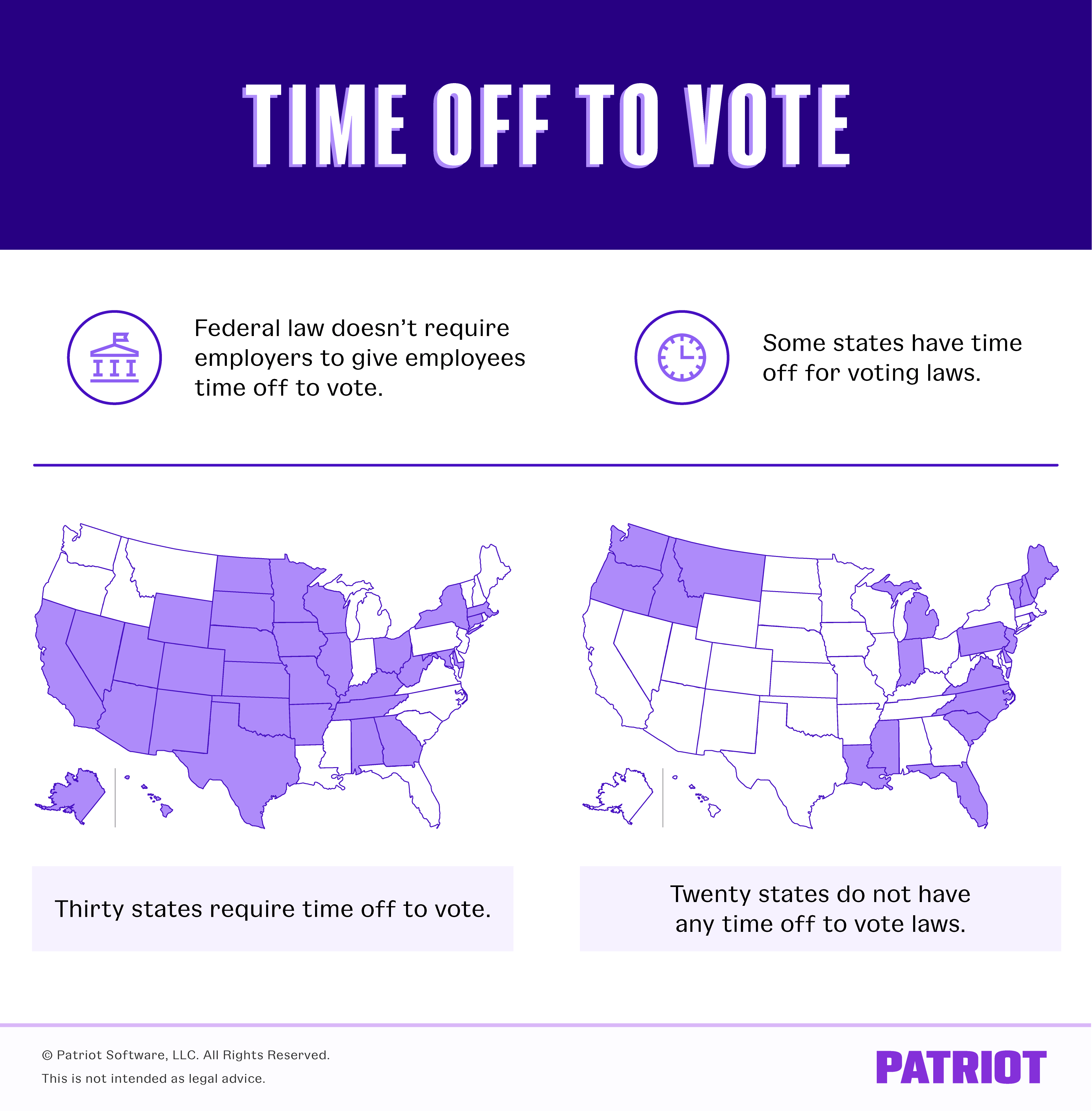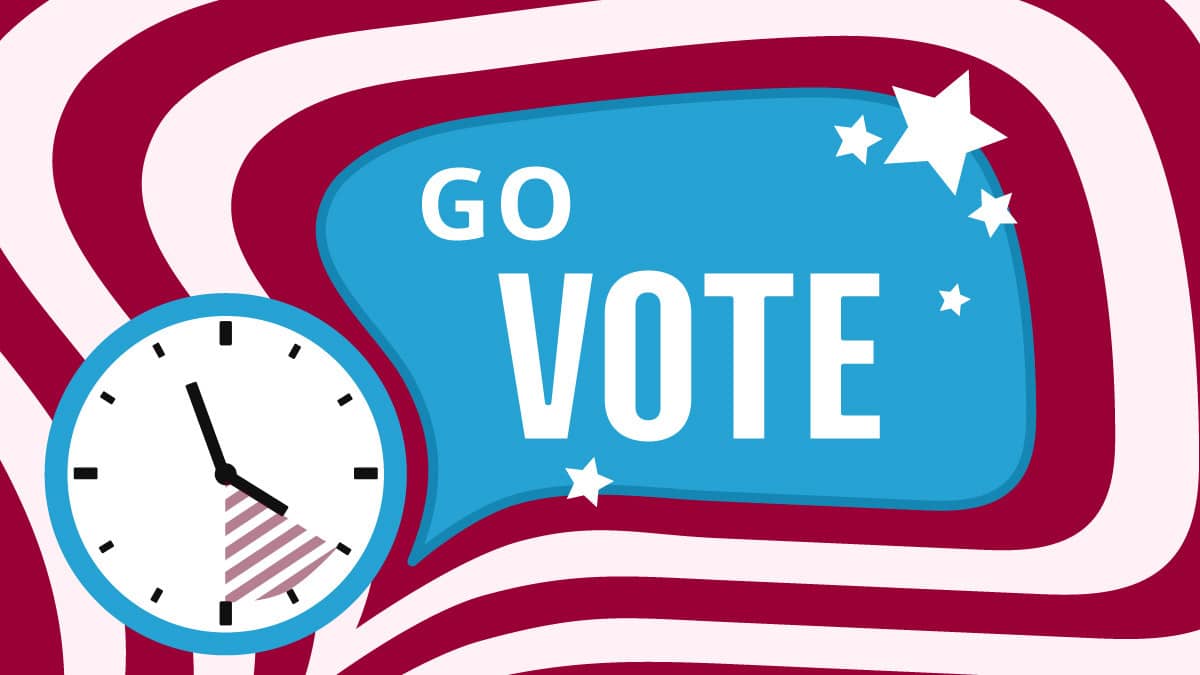As a small business owner, you may offer types of paid or unpaid time off to employees. But when election day rolls around, do you give employees time off to vote? Read on to learn about offering time off to vote, voting leave laws by state, and whether you can refuse voting leave.
Giving employees time off to vote
You may feel responsible for encouraging employees to vote. However, you might not be able to afford to give employees time off for voting leave.
Federal law does not require employers to give employees time off work to vote. However, the majority of states have time off for voting laws. Some states may also require employers to offer employee compensation for voting time, while others do not.
State laws on time off to vote
Time off for voting and employee voting rights vary from state to state. As an employer, you need to understand voting time off laws and policies your state has in place.
Thirty states require time off to vote. Some of these states also require that you provide paid time off to vote.
Twenty states plus Washington D.C. do not have any time off to vote laws. Some of the states that do not require time off to vote include Idaho, Maine, Michigan, New Jersey, and Virginia.
In some cases, states do not offer time off for voting for legitimate reasons. For example, Oregon is a vote-by-mail state that gives citizens the option of voting in-person. Since many individuals in Oregon cast their vote via mail, the state does not have laws regarding voting time off.
Other states, like North Dakota, may not have an official time off to vote law. But, they do recommend employers give employees time to vote.
Some states require employers to display a time off to vote poster. In California, employers must visibly post voting leave rules 10 days before the election. Check with your state to find out whether or not you must display or provide (e.g., via email) a time off to vote poster for your employees.
A number of states also require employees to notify employers in advance about voting and provide proof that they voted. Depending on your state’s time off to vote law, you may require employees to give one of the following types of proof that they voted:
- Voter’s receipt
- Sticker
- Other documentation or paperwork
If your state does not require time off to vote, consider offering it to employees. Regardless of whether or not you opt for paid time to vote, giving employees time off to vote shows you care. And, it sets an example to employees to fulfill their civic responsibility to vote.

Time off to vote laws by state
Depending on the state, hours usually vary anywhere from one to three hours of time off. For example, Colorado state law requires employees to receive up to two hours off to vote.
Other states, like Alaska, may not specify a time frame. States without a given time period typically list the amount of time as a “reasonable amount of time” to vote.
Review the chart of states and their requirements for time off to vote below:
| State | Time Off to Vote? | Time Allowed to Vote | Paid/Unpaid | Advance Notice Required? | Proof of Voting Required? |
|---|---|---|---|---|---|
| Alabama | Yes | Up to one hour | Unpaid | Yes: “Reasonable notice” | No |
| Alaska | Yes | Not specified | Paid | No | No |
| Arizona | Yes | Up to three hours | Paid | Yes: At least one day before the election | No |
| Arkansas | Yes | Employers must schedule employees’ work schedules on election days to give employees time to vote. | Unpaid | No | No |
| California | Yes | Up to two hours at beginning or end of shift. | Paid (up to two hours) | Yes: Two working days before the election | No |
| Colorado | Yes | Up to two hours | Paid (up to two hours) | No | No |
| Connecticut | No | N/A | N/A | N/A | N/A |
| Delaware | No | N/A | N/A | N/A | N/A |
| District of Columbia | No | N/A | N/A | N/A | N/A |
| Florida | No | N/A | N/A | N/A | N/A |
| Georgia | Yes | Up to two hours | Unpaid | Yes: “Reasonable notice” | No |
| Hawaii | Yes | Two consecutive hours (excluding meal or rest breaks) and employer cannot change employee’s regular work schedule. | Paid | No | Yes: Employees must show voter’s receipt. |
| Idaho | No | N/A | N/A | N/A | N/A |
| Illinois | Yes | Two hours | Paid | Yes: One day in advance for general or state election | No |
| Indiana | No | N/A | N/A | N/A | N/A |
| Iowa | Yes | As much time as will add up to 3 hours, when combined with non-work time. | Paid | Yes: In writing prior to the election | No |
| Kansas | Yes | Up to 2 hours or as much time as will add up to 2 hours when combined with non-work time. Employer can decide when hours are taken, but it may not be during a regular meal break. | Paid | No | No |
| Kentucky | Yes | Within a “reasonable time,” but not less than four hours. Employers can decide when hours are taken. | Unpaid | Yes: One day | No, but employee who takes time off and doesn’t vote may be subject to disciplinary action. |
| Louisiana | No | N/A | N/A | N/A | N/A |
| Maine | No | N/A | N/A | N/A | N/A |
| Maryland | Yes | Two hours | Paid | Yes: No specific time frame | Yes: Also includes attempting to vote. Must use the state board of elections form. |
| Massachusetts | Yes | First two hours that polls are open. | Unpaid | Employee must apply for leave of absence (no time specified). | No |
| Michigan | No | N/A | N/A | N/A | N/A |
| Minnesota | Yes | May be absent for the time necessary to appear at the polling place, vote, and return to work. | Paid | No | No |
| Mississippi | No | N/A | N/A | N/A | N/A |
| Missouri | Yes | Three hours. Employers may decide when hours are taken. | Paid | Yes: Prior to the day of election | None specified, but employees must actually vote to be paid. |
| Montana | No | N/A | N/A | N/A | N/A |
| Nebraska | Yes | As much time as will add up to two hours, when combined with non-work time. | Paid | Yes: Prior to or on election day | No |
| Nevada | Yes | If it is not practical to vote before or after work, employees may take voting time off based on distance from the polling place. Employees who work two miles or less from polling location may take one hour; two to 10 miles receives two hours; more than 10 miles has three hours. Employers decide when hours are taken. | Paid | Yes: Prior to election day | No |
| New Hampshire | No | N/A | N/A | N/A | N/A |
| New Jersey | No | N/A | N/A | N/A | N/A |
| New Mexico | Yes | Two hours | Paid | No | No |
| New York | Yes | As much time at beginning or end of shift as will give employee time to vote, when combined with non-work time. | Paid (up to two hours) | Yes: No more than 10 or less than two working days before the election | No |
| North Carolina | No | N/A | N/A | N/A | N/A |
| North Dakota | Yes | Employers are encouraged to give employees time off to vote when regular work schedule conflicts with the times polls are open. | Unpaid | No | No |
| Ohio | Yes | As long as it reasonably takes to vote. | Paid for salaried employees | No | No |
| Oklahoma | Yes | Two hours, unless employee lives so far from polling place that more time is needed. | Paid | Yes: Orally or in writing one day before the election | Yes |
| Oregon | No | N/A | N/A | N/A | N/A |
| Pennsylvania | No | N/A | N/A | N/A | N/A |
| Rhode Island | No | N/A | N/A | N/A | N/A |
| South Carolina | No | N/A | N/A | N/A | N/A |
| South Dakota | Yes | Two consecutive hours | Paid | No | No |
| Tennessee | Yes | Reasonable time up to three hours when the polls are open. | Paid | Yes: Before noon on the day before election day | No |
| Texas | Yes | No time limit. Employers may not refuse to allow employees to take time off. | Paid | No | No |
| Utah | Yes | Two hours at beginning or end of shift. | Paid | Yes: Before election day | No |
| Vermont | No | N/A | N/A | N/A | N/A |
| Virginia | No | N/A | N/A | N/A | N/A |
| Washington | No | N/A | N/A | N/A | N/A |
| West Virginia | Yes | Up to three hours | Paid | Yes: Written request at least three days before election | None specified. Employees must actually vote to be paid. |
| Wisconsin | Yes | Up to three consecutive hours | Unpaid | Yes: Before election day | No |
| Wyoming | Yes | One hour, other than a meal break. Not required if employee has at least 3 consecutive non-work hours available while polls are open. | Paid | No | None specified. Employees must actually vote to be paid. |
*Some states may have certain exceptions or additional requirements. Check with your state for more information.
Refusing voting leave
Prohibiting time off to vote can be detrimental to a business. Some states may issue penalties for refusing voting leave to employees, such as fines.
Even if your state does not have penalties, refusing time off for voting can tarnish your business’s reputation. Your employees and community might not agree with your decision. And, it may impact the way others view you and your business.
Looking for a simple way to track employees’ time off for voting? Patriot’s online time and attendance software lets employees clock-in and clock-out online. And, the software add-on integrates with our payroll software. Try both for free today!
This article has been updated from its original publication date of October 17, 2016.
This is not intended as legal advice; for more information, please click here.



